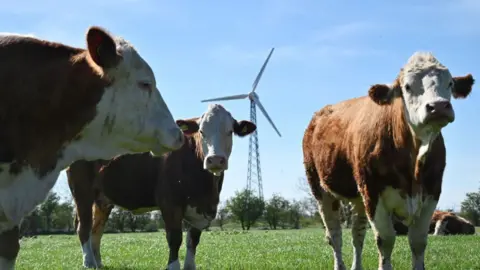Flatulence tax: Denmark agrees deal to tax farmers for livestock emissions
Vocabulary: 194, Words: 368

1Denmark has agreed on how to implement the world’s first tax on agricultural emissions, including flatulence by livestock.
2This comes after months of negotiations between the country’s major parties, farmers, the industry, trade unions and environmental groups. 3The Green Tripartite agreement was first announced in June.
4From 2030, farmers will have to pay a levy of 300 kroner ($43; £34) per tonne of methane (as per carbon dioxide equivalent) on emissions from livestock including cows and pigs, which will rise to 750 kroner in 2035.
5The Green Tripartite minister said they will “do what it takes to reach our climate goals” after receiving a “broad majority” in parliament.
6“[It is a] huge, huge task that is now underway: to transform large parts of our land from agricultural production to forestry, to natural spaces, to ensure that we can bring life back to our fjords,” Jeppe Bruus said.
7Part of the Green Tripartite agreement between the government, the agriculture industry and environmental organisations is to also reduce nitrogen pollution in an effort to restore the coasts and fjords. 8Nitrogen emissions could be reduced by 13,780 tonnes annually from 2027, AFP news agency reported.
9A concerted effort will also be made to improve the country's biodiversity.
10According to Danish daily The Copenhagen Post, 250,000 hectares of new forest will be planted, and 140,000 hectares of peatlands that are currently being cultivated will be restored to natural habitat.
11Peatlands are wetlands characterised by waterlogged conditions and are known carbon stores.
12Around 60% of Denmark's territory is currently cultivated, making it together with Bangladesh the country with the highest share of cultivated land, according to a Danish parliamentary report.
13"Danish nature will change in a way we have not seen since the wetlands were drained in 1864," Mr Bruus said, as quoted by AFP news agency.
14Speaking about the agreement, the Danish minister for climate, energy and utilities, Lars Aagaard, said it showed the country’s “willingness to act”.
15“It also shows the Danish model - broad political majority in the Danish parliament 16[and] involvement of the sectors that will be affected by the tax and involvement of environmental stakeholders," he added, explaining these are "things that we could all benefit from if the rest of the world could foster such cooperation in the climate fight.”
from BBC